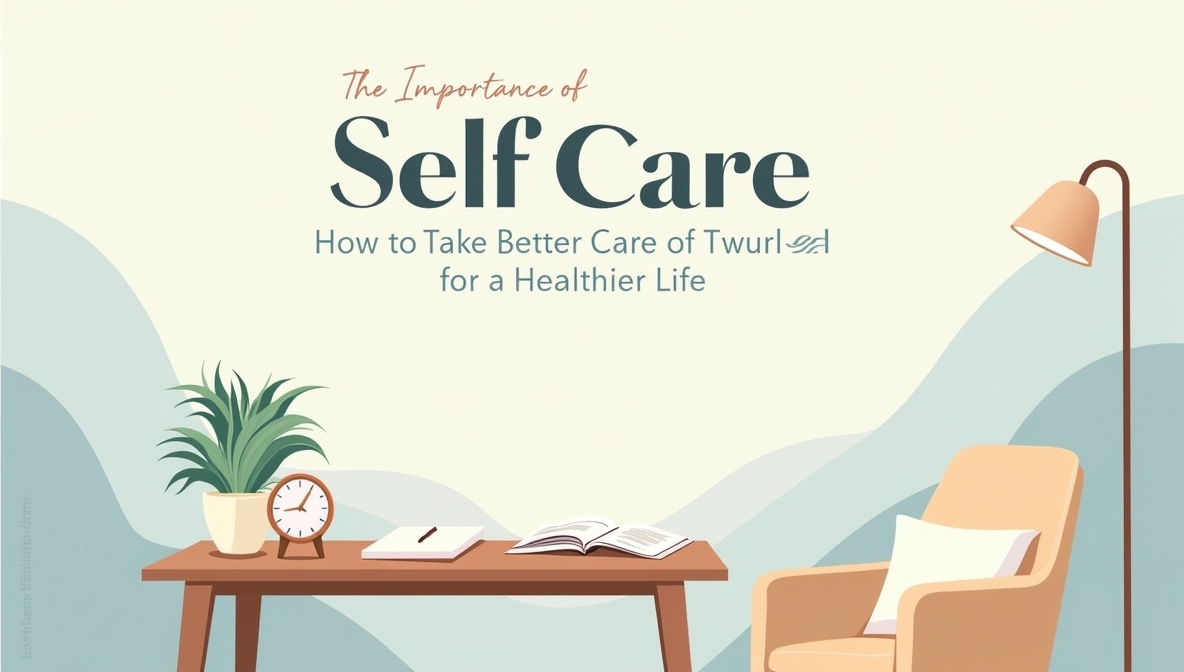In today’s fast-paced world, it’s easy to neglect ourselves in the pursuit of our goals, work, and responsibilities. Whether it’s running after deadlines, managing personal relationships, or handling the stress of daily life, many people forget that taking care of yourself is not just a luxury—it’s a necessity. Self-care isn’t about pampering yourself occasionally; it’s about integrating practices that promote your physical, mental, and emotional well-being into your routine. In this post, we’ll explore why self-care is so important and how you can make it a regular part of your life.
What is Self-Care?
Self-care refers to any activity or practice that we deliberately engage in to take care of our mental, emotional, and physical health. It includes simple activities like getting enough sleep, eating well, exercising, and practicing relaxation techniques. It can also mean setting boundaries, saying no when necessary, and making time for activities that bring you joy and relaxation.
Self-care isn’t selfish—it’s essential for maintaining balance and well-being. By taking care of yourself, you’re better equipped to handle life’s challenges and support others around you. When you invest in your own health, you are creating the foundation for a happier, more productive life.
Why is Self-Care Important?
1. Boosts Physical Health
Taking care of your body through proper nutrition, regular exercise, and adequate sleep helps prevent chronic illnesses, increases energy levels, and improves overall health. A consistent self-care routine can lower the risk of heart disease, diabetes, and other lifestyle-related conditions.
2. Enhances Mental Health
Engaging in self-care activities can significantly improve your mental health. Practices like mindfulness meditation, journaling, and relaxation techniques help reduce anxiety, manage stress, and boost mood. Regular self-care can also improve cognitive function, increase focus, and enhance overall productivity.
3. Reduces Burnout
When you neglect self-care, you increase the risk of burnout—a state of physical, mental, and emotional exhaustion caused by excessive stress. By incorporating self-care into your daily life, you can prevent burnout, recharge your energy, and regain your enthusiasm for work and life.
4. Increases Resilience
Self-care practices build resilience, allowing you to bounce back from setbacks more quickly. Taking time for yourself helps you process emotions, reduce stress, and maintain emotional balance, so you can approach challenges with a clearer, more focused mind.
How to Incorporate Self-Care into Your Routine
1. Prioritize Sleep
Sleep is one of the most important aspects of self-care, yet it’s often overlooked. Lack of sleep can lead to irritability, poor decision-making, and a weakened immune system. Aim for at least 7-9 hours of quality sleep each night to ensure you wake up feeling refreshed and ready to tackle the day. Establishing a bedtime routine and sticking to a regular sleep schedule can help improve the quality of your sleep.
2. Nourish Your Body
Eating a balanced, nutrient-rich diet is a key part of self-care. Your body needs a variety of nutrients to function at its best. Focus on whole, unprocessed foods like fruits, vegetables, whole grains, lean proteins, and healthy fats. Drink plenty of water throughout the day, and try to limit your intake of processed foods, sugary snacks, and caffeine, as they can negatively affect your energy levels and mood.
3. Get Moving
Exercise is not just for weight loss—it’s a crucial component of self-care. Physical activity boosts mood by releasing endorphins, improves mental clarity, and helps reduce stress. Find an exercise routine that works for you, whether it’s walking, yoga, dancing, or strength training. Even a short walk each day can have significant benefits for both your body and mind.
4. Practice Mindfulness
Mindfulness is the practice of staying present and fully engaged in the moment. It helps reduce stress, increase focus, and enhance emotional regulation. You can practice mindfulness through meditation, breathing exercises, or simply by paying attention to your surroundings. Taking a few minutes each day to focus on your breath or perform a guided meditation can help calm your mind and improve overall well-being.
5. Set Boundaries
One of the most important aspects of self-care is learning to say no. Setting boundaries is essential to maintaining your physical and emotional health. Don’t overcommit yourself to work, social events, or other obligations. Learn to prioritize your well-being and make time for activities that recharge you. Saying no doesn’t make you selfish—it makes you empowered to take control of your time and energy.
6. Make Time for Activities You Enjoy
Incorporating activities that bring you joy into your routine is essential for emotional self-care. Whether it’s reading, painting, gardening, or spending time with loved ones, make time for things that make you happy. These activities help you relax, increase happiness, and provide an outlet for creativity and self-expression.
Overcoming Barriers to Self-Care
For many, the concept of self-care can feel overwhelming or even indulgent. If you struggle to make time for yourself, start small. Begin by incorporating just one or two self-care practices into your routine, and gradually build from there. Remember, self-care doesn’t have to be a major time investment. Even short, simple acts of self-care can have a significant impact on your well-being.

